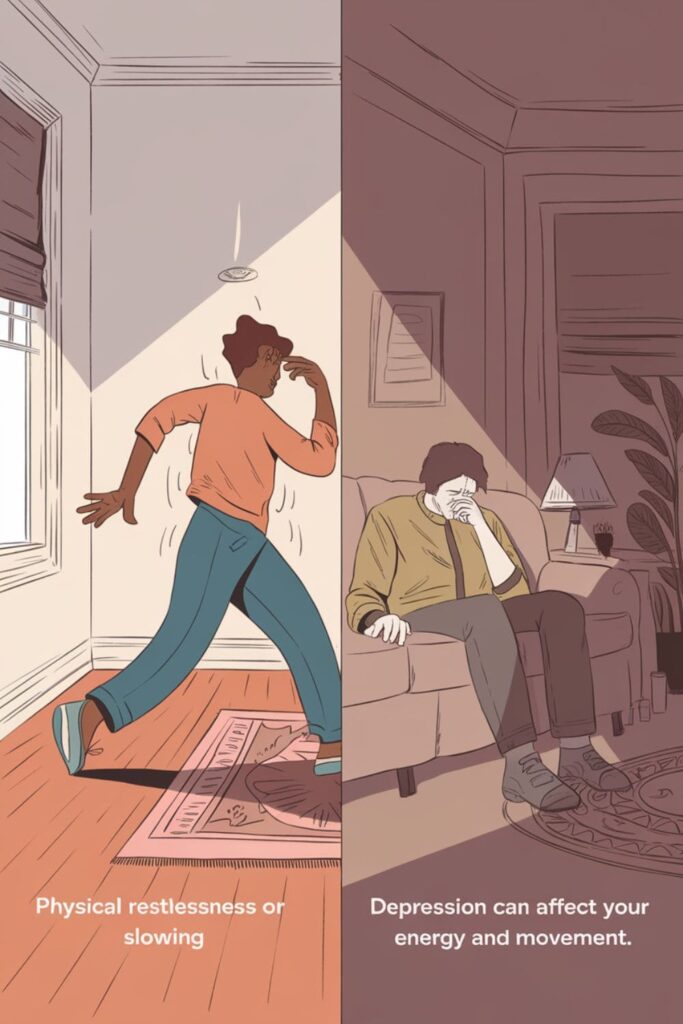Depression silently affects millions worldwide, often creeping in without obvious warning signs, so knowing about these subtle indicators can mean the difference between early intervention and prolonged suffering.
Everyone does experience occasional sadness, but clinical depression manifests through persistent symptoms that significantly impact daily life.
Medical professionals emphasize the importance of recognizing these warning signs early on, as timely intervention leads to better outcomes.
Disclaimer: Make sure to consult a professional before coming to any conclusions.

Early Warning Signs of Depression You Shouldn’t Ignore
1. Increased Substance Use

Many people unconsciously self-medicate depression symptoms through increased alcohol or substance use, weekend drinks become daily habits.
Prescription medications might be misused to numb emotional pain, this coping mechanism temporarily masks depression while creating additional health risks, and substance use often escalates gradually as depression deepens.
So, make your mind and never drink alcohol or do substance abuse ever again.
2. Morning Depression

Many experience particularly severe symptoms in the morning, struggling to face the day ahead, then getting out of bed becomes an overwhelming challenge.
Morning anxiety peaks as people contemplate daily responsibilities, and this pattern often improves slightly as the day progresses but returns each morning with crushing regularity.
3. Physical Restlessness or Slowing

Depression sometimes manifests through visible changes in physical movement, some people display constant restlessness, fidgeting continuously.
Others move noticeably slower, as if walking through water. These physical manifestations often accompany internal turmoil and emotional distress. Observable changes in movement patterns can signal worsening depression.
4. Social Withdrawal and Isolation

Depression always leads people to withdraw from social connections, often making excuses to avoid all kinds of interactions, phone calls go unanswered, and text messages remain unread.
Social obligations feel burdensome rather than enjoyable. This isolation further feeds depressive symptoms, creating a lonely cycle that’s difficult to break, and support systems weaken as the person pulls away from friends and family.
5. Feelings of Worthlessness and Guilt

Depression distorts self-perception, which leads to excessive guilt and feelings of worthlessness, and people blame themselves for circumstances beyond their control. Past mistakes, no matter how minor, become sources of intense shame and trauma.
These negative thought patterns create a self-reinforcing cycle of low self-esteem and depression. Regular activities feel increasingly challenging as self-doubt grows stronger.
Related: 10 Ways Social Media Impacts Your Mental Health!
6. Changes in Personal Hygiene

Declining all personal care often indicates deepening depression, as basic hygiene routines become overwhelming tasks. Clothes go unwashed, and personal appearance also suffers.
This neglect usually happens gradually, making it hard for the person to recognize the extent of the change. Family members often notice these shifts in grooming habits before the individual acknowledges them.
7. Irritability and Mood Swings

Unexpected irritability and emotional volatility often signal depression, particularly in men, and then small inconveniences can trigger disproportionate reactions. Patience wears thin more quickly than usual.
These mood swings strain relationships at home and work, and the person might feel immediately regretful about their outbursts but struggle to control these emotional responses.
8. Persistent Fatigue and Low Energy

Overwhelming exhaustion plagues many people with depression, regardless of how much they rest. Simple tasks like showering or preparing meals feel monumentally challenging.
This bone-deep fatigue differs from normal tiredness, it doesn’t improve with rest or with sleep. The brain requires more energy to process information and complete basic tasks, leading to constant mental and also physical exhaustion.
9. Difficulty Concentrating and Making Decisions

Depression fog affects cognitive function significantly. Work performance often suffers as concentration becomes increasingly difficult, then evensmall decisions, like choosing what to wear or eat, feel overwhelming.
The brain processes information more slowly, making it harder to focus on conversations or remember important details. This cognitive impairment often leads to decreased productivity and increased frustration.
10. Loss of Interest in Previously Enjoyed Activities

A person experiencing depression often abandons hobbies and activities that once brought joy to him or her. The enthusiastic gardener stops tending their plants.
The avid reader can’t focus on books anymore. This withdrawal from pleasurable activities, known as anhedonia, represents a core symptom of depression.
Related: 10 Signs to Prioritize Your Mental Health!
Conclusion
Recognizing these warning signs represents the crucial first step toward recovery. Depression responds well to treatment, particularly when caught in early stages. Professional help through therapy, medication, or a combination of both can significantly improve outcomes.
If you or someone you know exhibits several of these symptoms for more than two weeks, seeking professional evaluation becomes essential, and remember, reaching out for help demonstrates strength, not weakness.
